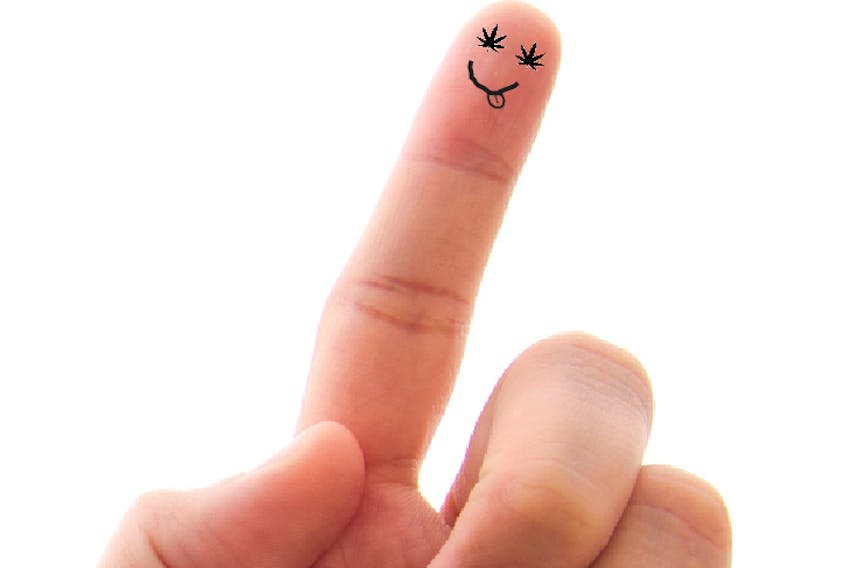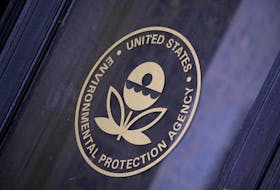SYDNEY, N.S. — A Sydney native has invented a device that could help police make light work — literally — of determining if a person is high.
Duncan MacIntyre is founder and majority owner of Isbrg Corp. The Toronto-area company is developing a handheld scanner he says will provide an accurate and precise measurement of THC intoxication without requiring a saliva, breath, urine or blood sample.
The computer mouse-sized device, which is called Spotlight, has an aperture similar a cellphone camera on the top. You run your finger over the aperture and a beam of near-infrared light is emitted that quickly scans your blood for certain tell-tale compounds that reveal whether you’re actually feeling the effects of THC, and don’t simply have metabolites lingering in your body, like most devices used by law enforcement.
“It shines on the finger for 20 seconds, and that’s the test,” said MacIntyre, who grew up on Cabot Street in Sydney’s south end.
“What we compare it to is these drug recognition experts that are being deployed across the country. When you think about it, they’re reacting to physical cues that are consistent with intoxication. What we’re really doing is measuring the impact of those physical cues internally, as opposed externally, and in 20 seconds as opposed to an hour.”
MacIntyre, who has authored or co-authored approximately 30 U.S. patents in the field of spectroscopy, which involves the use of light to detect blood substances, didn’t intend to get into the THC detection business. He founded Isbrg (pronounced iceberg) last year after associates at the National Optics Institute told him the Ontario provincial government was inviting companies to submit new technology that could help law enforcement measure THC intoxication. On Monday, government scientists and private-sector experts selected Spotlight as one of the winners, awarding Isbrg $100,000 to help with development costs.
The major challenge for Isbrg Corp. is building a robust algorithm so they can create what MacIntyre calls a “fingerprint of intoxication” for THC. He said Spotlight will soon not only be able identify a wide variety of blood analytes that indicate if a person is buzzing from THC, it will even take into account factors like gender, race, weight, and frequency of cannabis use.
MacIntyre is working closely with another Cape Bretoner to make Spotlight the THC detection device of choice for law enforcement officials around the world. Childhood friend Allan MacDougall, a veteran of the Canadian Security Intelligence Service who grew up in the Hardwood Hill area, is chair of Isbrg’s advisory board. MacDougall, the son of Kaye and the late Porgy MacDougall, brings an impressive wealth of international experience to the company. Over the course of his 26-year career, MacDougall held various senior positions with CSIS, including chief of counter-terrorism operations, director of Middle East and Africa, and director general of global operations. He is currently the Canadian director of Crumpton Group LLC, a strategic international advisory and business development firm.
MacIntyre said if all goes well, Spotlight could be used by police forces around the world by 2020. He expects each unit would cost about $1,500.
“If we do this very efficiently, we could be in the market in a year. My guess is it will probably be more like 14 months,” he said. “Within probably 18 months we’d be in the hands of law enforcement.”
Eventually, he said Spotlight could be expanded to detect other forms of intoxication.
“The great opportunity of using light is that in creating, as we call it, the fingerprint of intoxication for different substances, is that we can build this unit eventually to detect the unique source of intoxication, which could include alcohol, cocaine, opioids, that sort of thing. So instead of a police officer trying to guess what type of intoxication exists and hauling out different devices from the back of their car, they could use this eventually as one-stop-shopping.”
Duncan MacIntyre
- Born: Sydney
- Age: Prefers not to reveal in print, saying: “With any startup, the innovation side of things seems to be the sole domain of younger people.”
- Lives: Mississauga, Ont.
- Family: Parents Agnes and the late Marty MacIntyre; sisters Linda, Katheryn and Mary; sons Marty, Jordan and Austin
- Alma mater: Saint Mary's University
- Career highlights: Former president of Orica Canada and Latin America; general manager and vice-president of Monsanto in Canada; vice-president of NutraSweet International, and CEO of NIR Diagnostics. Earlier in his career, he was founding president and CEO of the National Quality Institute of Canada (Excellence Canada).









